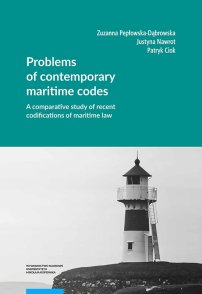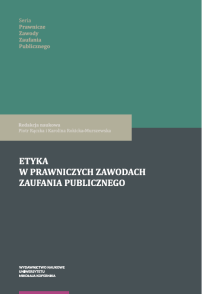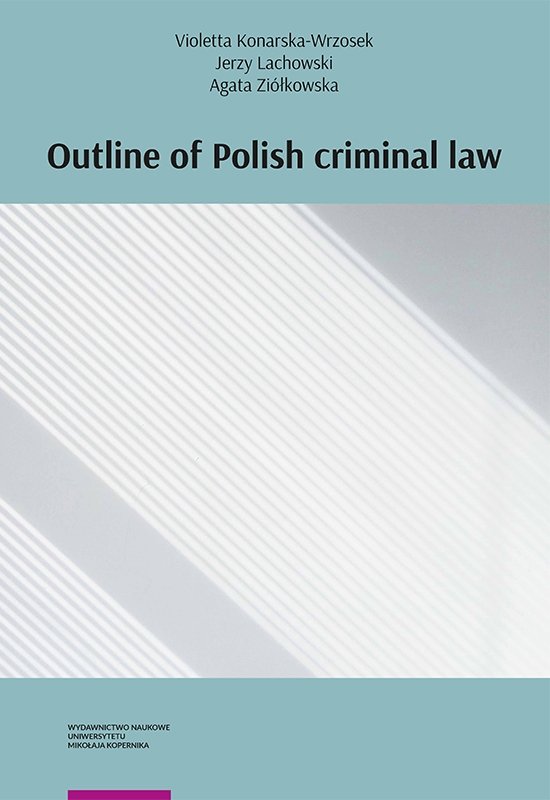Titular professor, head of the Department of Criminal Law of the Faculty of Law and Administration of the Nicolaus Copernicus University in the years 2011–2022. She specialises in the field of substantive criminal law: common law, fiscal law, petty offences and juvenile issues. Author of 180 scientific publications of a monographic, systemic, commentary, textbook and article character in this field. Permanent reviewer of several legal scientific journals. Member of the Main Board of the Scientific Society of Criminal Law in Warsaw, member of the Prof. Stanisław Batawia Polish Criminological Society and the Polish Section of AIDP.
Outline of polish criminal law
This book presents to the readers the outline of the basic principles of Polish criminal law. In the general part, it discusses the fundamental institutions, including penalties, penal, probation and security measures. The main types of crimes in the special part of the Polish Penal Code are also presented. Thanks to this approach, the foreign reader can get to know the system of Polish criminal law. The book will be useful not only for those who scientifically deal with comparative research in the field of criminal law, but also for foreign solicitors, judges and prosecutors who will come into contact with Polish criminal law in their daily work.
INTRODUCTION / 9
PART ONE
GENERAL PART OF CRIMINAL LAW
Chapter I. General principles of Polish criminal law / 13
§1 Principle of nullum crimen sine lege / 13
§2 Nulla poena sine lege principle / 15
§3 Principle of nullum crimen sine culpa / 16
§4 Principle of nullum crimen sine periculo sociali / 17
§5 Lex criminalis severior retro non agit principle / 18
§6 Principle of an individual’s liability for an offence / 19
§7 Principle of liability for intentional wrongful acts / 19
§8 Principle of humane treatment / 20
Chapter II. Elements of a crime / 23
§1 Conduct / 23
§2 Criminal conduct and its unlawfulness / 24
§3 Guilt / 24
§4 Social harmfulness of the act / 25
Chapter III. Forms of offence / 27
§1 Preparation and attempt / 27
§2 Accesories / 30
Chapter IV. Defences in criminal liability / 33
§1 Concept of justifications and excuses in criminal liability / 33
§2 Justifications / 33
§3 Excuses / 37
Chapter V. Penalties / 39
§1 Penalty of a fine / 39
§2 Restriction of liberty (community service or wage deduction) / 40
§3 Imprisonment / 42
Chapter VI. Penal, compensatory and forfeiture measures / 43
§1 Penal measures / 43
1. General characteristics / 43
2. Deprivation of public rights (Articles 39(1) and 40 of the Penal Code) / 44
3. Prohibition to hold a specific position/practice a specific profession/carry out specific business activity (Article 39 item 2 of the Penal Code and Articles 41§1 and 2 of the Penal Code) / 45
4. Prohibition to carry out activities related to the upbringing, treatment, education or care for minors (Articles 39(2a) and 41§1a and 1b of the Penal Code) / 45
5. Prohibition to hold a position or exercise a profession or work in state and local government bodies and institutions, as well as in commercial law companies in which the State Treasury or a local government unit holds, directly or indirectly through other entities, at least 10% of the shares or stocks (Article 39 item 2aa of the Penal Code and Articles 41§1aa and 1ab of the Penal Code) / 45
6. Prohibition to stay in certain environments or places, to contact certain persons, to approach certain persons or to leave a certain place of residence without the permission of the court (Article 39 paragraph 2b of the Penal Code and Article 41a of the Penal Code) / 46
7. Prohibition of entry to a mass event (Article 39 point 2c of the Penal Code and Article 41b of the Penal Code) / 47
8. Prohibition of entry to gambling establishments and participation in gambling games (Articles 39(2d) and 41c of the Penal Code) / 47
9. Temporary injunction to vacate premises occupied together with the victim (Articles 39(2e) and 41a(1) of the Penal Code) / 47
10. Driving ban (Article 39 point 3 of the Penal Code and Article 42 of the Penal Code) / 47
11. Dimension of criminal measures / 48
§2 Compensatory measures / 57
§3 Forfeiture / 61
Chapter VII. Severity of penalty / 67
§1 General principles and directives for the imposition of punishment and other measures / 67
§2 Institution of extraordinary leniency / 73
§3 Institution of extraordinary aggravation of penalty / 75
Chapter VIII. Probation and parole / 81
§1 Concept of probation / 81
§2 Conditional discontinuation of criminal proceedings / 81
§3 Conditional suspension of imprisonment / 83
§4 Conditional early release from imprisonment (parole) / 86
Chapter IX. Concurrence of laws and offences / 89
§1 Concept of concurrence of laws and offences / 89
§2 Concurrence of laws / 89
§3 Concurrence of offences / 91
§4 Rules for the imposition of a cumulative sentence / 93
Chapter X. Preventive measures / 95
Chapter XI. Criminal statute of limitations for offences and for the execution of the sentence imposed / 101
§1 Limitation on the punishability of offences / 101
§2 Limitation on execution of sentence / 103
Chapter XII. Obliteration of conviction / 105
PART TWO
SELECTED TYPES OF CRIMES
§1 Offences against life and health / 111
§2 Offences against public safety and safety of communication / 125
§3 Offences against liberty, dignity and bodily integrity / 135
§4 Offences against sexual freedom and morals / 143
§5 Offences against the family and guardianship / 149
§6 Offences against the activities of state and local government institutions / 155
§7 Offences against administration of justice / 161
§8 Offences against public order / 175
§9 Offences against protection of information / 193
§10 Offences against credibility of documents / 203
§11 Offences against property / 219
§12 Offences against business relations and interest in property in civil law transactions / 241
§13 Offences against money and securities trading / 257
Violetta Konarska-Wrzosek
- Dyrektywy wyboru kary w polskim ustawodawstwie karnym
Jerzy Lachowski
University professor, head of the Department of Criminal Law at the Faculty of Law and Administration of the Nicolaus Copernicus University in Toruń. Co-author of two commentaries to the Penal Code (edited by M. Królikowski, R. Zawłocki and V. Konarska-Wrzosek), co-author and editor of commentaries to the Executive Penal Code and the Code of Petty Offences, and author of about 150 scientific publications in the area of substantive criminal law, criminal proceedings and criminal enforcement law. Vice-president of the Criminal Law Scientific Society in Warsaw, member of the Polish Penitentiary Society in Kalisz and the Association Internationale De Droit Penal. He was awarded the Medal of the National Education Commission. He completed judge training and passed the judge exam and is a professionally active solicitor at the Kuyavian-Pomeranian Bar Association.
Agata Ziółkowska
Assistant professor at the Department of Criminal Law of the Nicolaus Copernicus University in Toruń. Author and co-author of over 60 scientific publications of a commentary, monographic and article nature in the field of broadly understood substantive criminal law and military law. She specialises in common and military criminal law, in military disciplinary regulations and in matters regulated by the Act on Weapons and Ammunition and the Act on Direct Coercive Measures and Firearms. From 2021, dr Agata Ziółkowska, as a soldier, participates in cyclical military trainings carried out by the Military Police. As part of the activities undertaken for the Department of Criminal Law of the Nicolaus Copernicus University in Toruń, dr Agata Ziółkowska also runs Clinic 42 and is the scientific supervisor of the Scientific Students Association of Criminal Law. She is also a reviewer in scientific journals in the fields of law, military, security and state defence.
- Prawnokarne aspekty ochrony początków życia ludzkiego
Powiązane

Faculty of Law and Administration

The Protection of Legitimate Expectations in International Investment Law
Marcin Kałduński
Solidarity. The Martial Law in Poland. First days
Wojciech Polak
Problems of contemporary maritime codes. A comparative study of recent codifications of maritime law
Zuzanna Pepłowska-Dąbrowska, Justyna Nawrot, Patryk CiokInne z tej kategorii

Obowiązki edukacyjne. Analiza administracyjnoprawna
Dominika Zawacka-Klonowska
Kluby i związki sportowe w Polsce. Aktualne problemy prawne

Kompetencje Rzecznika Praw Obywatelskich w zakresie kontroli uchwał organów stanowiących jednostek samorządu terytorialnego
Marcin Dorochowicz






